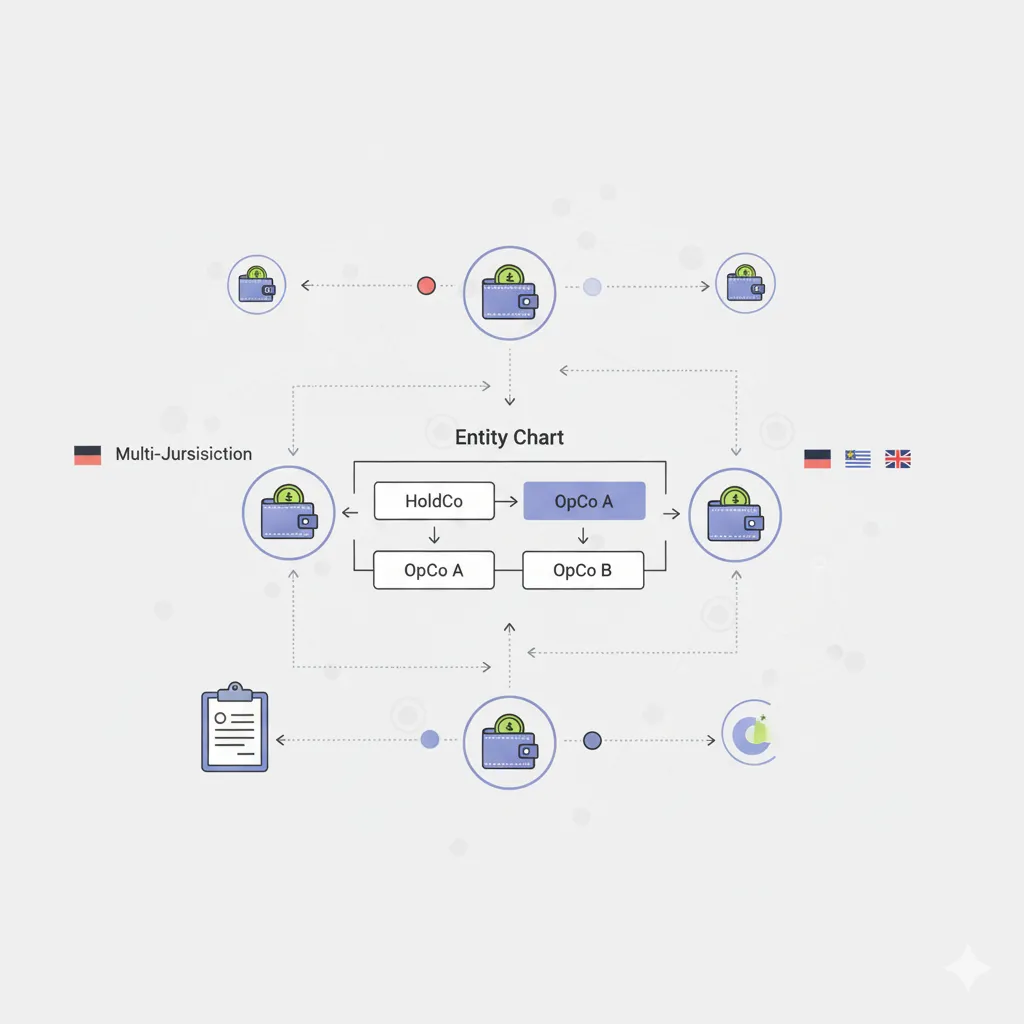How IRC Section 1012(c) Revolutionized Cryptocurrency Basis Tracking for Business Owners
The landscape of cryptocurrency taxation fundamentally changed on January 1, 2025, when the Internal Revenue Service eliminated one of the most convenient accounting methods available to crypto businesses: the universal pool approach.
This comprehensive guide examines the transition to mandatory wallet-by-wallet accounting under IRC Section 1012(c) and provides actionable strategies for crypto founders and their legal advisors.
Understanding the Universal Pool Method – What We Lost
What Was the Universal Pool Method?
Prior to January 1, 2025, cryptocurrency holders could aggregate all digital assets of the same type across multiple wallets, exchanges, and platforms for tax calculation purposes.
This “universal pool” approach allowed businesses to:
- Combine Bitcoin holdings from Coinbase, Kraken, and hardware wallets
- Apply a single cost basis calculation across all platforms
- Use FIFO (First In, First Out) methodology across their entire crypto portfolio
- Simplify record-keeping by treating all assets as a unified pool
Why Founders Preferred Universal Pool Accounting
The universal pool method provided significant administrative advantages for growing crypto businesses:
- Simplified Recordkeeping: Founders could maintain one master spreadsheet rather than tracking dozens of separate accounts
- Tax Optimization: Strategic transfers between platforms didn't create immediate tax events
- Reduced Compliance Costs: Less complex calculations meant lower accounting fees
- Audit Defense: Simpler documentation made IRS audits more manageable
Real-World Example – Pre-2025 Crypto Trading Business
Consider TechCorp, a Delaware C-corporation that purchased Bitcoin across three platforms:
Under the universal pool method, TechCorp could sell 4 BTC and apply FIFO across all holdings, recognizing the lowest-cost Bitcoin first (from Coinbase) regardless of which platform executed the sale.
The New Reality – IRC Section 1012(c) Mandate
Legal Foundation of the Change
IRC Section 1012(c)(1) now explicitly requires that basis determination for digital assets be applied “on an account-by-account basis.”
This statutory language, effective for all transactions after December 31, 2024, represents the most significant change to crypto taxation since the IRS first provided guidance on virtual currencies.
Treasury Regulation § 1.1012-1(j) Implementation
The implementing Treasury regulation provides detailed guidance on the new requirements:
- Separate Accounting Required: Each wallet, exchange account, and custodial arrangement must maintain independent basis tracking
- Platform-Specific FIFO: Cost basis calculations apply only within individual accounts
- No Cross-Platform Aggregation: Transfers between platforms create taxable events requiring separate tracking
Comparison – Universal Pool vs. Wallet-by-Wallet Method
What Constitutes a Separate “Account” Under the New Rules
The regulations define accounts broadly to include:
- Exchange Accounts: Each trading platform (Coinbase, Kraken, Binance, etc.)
- Custodial Wallets: Hosted wallets with third-party custody
- Hardware Wallets: Self-custody solutions (Ledger, Trezor, etc.)
- Smart Contract Positions: DeFi protocol positions and liquidity pools
- Corporate Wallets: Business treasury management accounts
Compliance Implementation Strategy
Step 1 – Account Inventory and Documentation
Crypto businesses must conduct a comprehensive audit of all digital asset holdings.
- List all exchange accounts with current balances
- Document hardware wallet addresses and seed phrases securely
- Identify DeFi protocol positions and staking arrangements
- Catalog custodial services and institutional accounts
- Map corporate treasury wallet addresses
Step 2 – Historical Basis Allocation Using Revenue Procedure 2024-28
The IRS provided a one-time safe harbor through Revenue Procedure 2024-28, allowing businesses to allocate their existing universal pool basis to specific accounts.
This safe harbor expired with the 2025 tax filing deadline, but businesses that completed the allocation can rely on this methodology.
Safe Harbor Allocation Requirements:
- Reasonable Allocation Method: Basis must be distributed logically among accounts
- Documentation Requirement: Written allocation methodology must be maintained
- Consistency Mandate: Once allocated, the methodology becomes irrevocable
- Professional Guidance: Complex allocations require CPA or attorney oversight
Step 3 – Ongoing Compliance Systems
Modern crypto businesses require sophisticated software solutions to manage compliance.
Enterprise-grade options include Lukka, Chainalysis Kyt, CoinTracker Enterprise, and Koinly Business.
Key Software Features Required:
- Real-time API connections to major exchanges
- Hardware wallet integration via public address tracking
- DeFi protocol transaction parsing and categorization
- Multi-entity support for corporate structures
- Professional accountant collaboration tools
Legal Implications for Crypto Founders
Corporate Governance Considerations
The new wallet-by-wallet requirements create significant corporate governance implications.
Crypto businesses should adopt formal policies addressing:
- Authorized wallet creation and management procedures
- Segregation of operational vs. treasury crypto assets
- Internal controls for private key management
- Regular reconciliation and audit procedures
Internal Controls Framework:
Audit Implications and IRS Enforcement
The wallet-by-wallet requirement significantly increases audit risk for crypto businesses.
Audit Triggers:
- Inconsistencies between 1099-DA forms and corporate tax returns
- Large unexplained transfers between wallets
- Unusual trading patterns or transaction volumes
- Missing or incomplete cost basis documentation
Planning Opportunities and Advanced Strategies
Tax Loss Harvesting in the New Environment
While the universal pool method allowed sophisticated tax loss harvesting strategies, the new rules create different opportunities including wallet-specific loss harvesting through strategic selection of high-basis wallets for sales, timing of inter-wallet transfers to optimize tax outcomes, and utilization of specific identification methods within individual accounts.
Entity Structure Optimization
Some businesses may benefit from restructuring their crypto operations across multiple legal entities.
Potential Structures:
- Separate trading entities for high-frequency activities
- Treasury holding companies for long-term Bitcoin reserves
- International structures for global trading operations
Caution: Such strategies require careful analysis of substance-over-form doctrines and potential consolidation issues.
International Considerations
Cross-Border Crypto Operations
For crypto businesses with international operations, the new rules create additional complexity.
Transfer Pricing Implications:
- Inter-company crypto transfers require arm's-length documentation
- Separate basis tracking may affect transfer pricing calculations
- International tax planning strategies require careful review
CARF Reporting Coordination
The Crypto-Asset Reporting Framework creates additional reporting obligations that must be coordinated with the new U.S. rules.
Long-Term Strategic Implications
Industry Transformation
The elimination of universal pool accounting represents a broader trend toward increased crypto regulation and oversight.
Regulatory Trajectory:
- Enhanced reporting requirements likely to expand
- Greater coordination between domestic and international tax authorities
- Increased penalties for non-compliance
- Professional services industry adaptation to new requirements
Competitive Implications
Crypto businesses that implement robust compliance systems early will have competitive advantages:
- Reduced audit risk and associated costs
- Enhanced credibility with investors and partners
- Simplified due diligence for M&A transactions
- Professional management capabilities attractive to institutional clients
Conclusion
The transition to wallet-by-wallet crypto tax accounting eliminates the simplicity of universal pool methods but creates opportunities for professional crypto businesses to demonstrate institutional-grade compliance.
Founders must immediately implement systematic tracking, invest in professional-grade technology solutions, and establish formal governance procedures.
Success requires treating crypto tax compliance as a core business function rather than an afterthought.
Next step: Review your current recordkeeping systems and prepare for enhanced Form 1120 corporate reporting requirements.

.svg)












